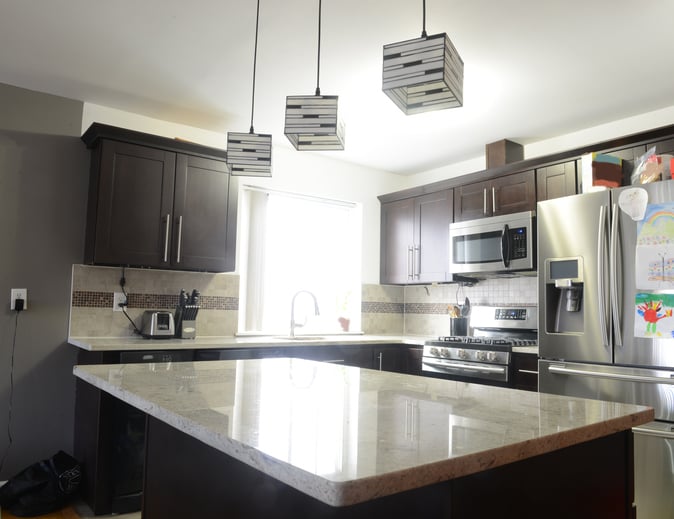
Durability is one reason homeowners choose natural stone for their kitchens and bathrooms, but the greatest appeal is often the sheer beauty of the material. Maintaining that luster and shine requires a bit of effort, but the ability to enjoy the unique character of natural stone makes it all worthwhile.
It’s important to understand the shine on granite and other natural stone is not from applying a wax, but a natural shine that reflects a rigorous process.
After being quarried from the earth’s surface using a combination of diamond wire cables, drills and even dynamite, these stone blocks are taken to a factory for processing. A giant gang saw using diamond blades slices the blocks into a calibrated thickness, similar to a giant bread slicer.
The next step is a polishing line, where blocks pass under diamond polishing heads that apply thousands of pounds of pressure per square inch. Here, progressively finer grits bring out the natural polish of the stone. It’s this factory finish that enhances the inherent characteristics of natural stone – the veins, swirls and crystals. From there the slabs are bundled and shipped to local stone manufacturers and installers to be cut to a homeowner’s specifications.
Once installed, you can maintain that luxurious factory finish with these tips from the experts at Granite Gold.
Clean often. Even miniscule particles could have a detrimental effect on your natural stone. However, it’s important to avoid common cleaners and abrasives as they can break down the protective seal and result in expensive repairs or replacement. Also avoid using an abrasive scrubbing pad, which may leave unsightly scratches. Rely on scrubbing pads designed specifically for natural stone or look for “non-scratch” on the packaging.
“Common, everyday household cleaners aren’t formulated for granite, marble, travertine or any other natural-stone surface,” says Lenny Sciarrino, CEO and co-founder of Granite Gold Inc. “They will dull the natural finish – the great luster and shine everyone enjoys – and lead to costly repair or replacement.”
Seal frequently. Frequently sealing natural stone surfaces maintains maximum surface protection, penetrating stone surfaces to provide superior, long-lasting resistance to staining, etching and soil buildup. It’s easy to test when to reseal. Pour water (about 3 inches in diameter) on the surface and let it sit for 30 minutes. If the water beads, then the stone remains sealed. However, if a dark mark or ring is created by the water, it is time to reseal. Be sure to repair any etching or stains before the sealant is applied.
Polish regularly. Polishing not only brings out the stone’s natural beauty, it reinforces the protective seal and provides ongoing protection against water spots and fingerprints.


